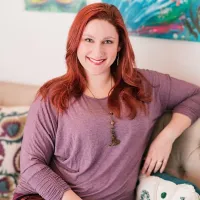

Moon Essence™ Blog
Blog

Educate Yourself: Knowledge Is Key To Reducing Period Problems

Knowledge is power, especially when it comes to menstrual health. With everything going on in the world these days, it’s easy to feel powerless.
Are you afraid to come off of birth control because you don’t want to get pregnant? Is the overturn of Roe versus Wade changing how you’re thinking about your dating life?
The power that comes with knowing your body and how a healthy period is your ticket to the freedom and autonomy you want in your life.
Ignorance Is Not Bliss
Our lack of knowledge around simple body function impairs our ability to take care of our reproductive health. It impairs our ability to make reproductive related decisions. It impairs our ability really to have a meaningful relationship with a partner.
If your partner doesn’t understand that you are a cyclical being and that you can pee with a tampon in due to a lack of education – how can they properly support you?
There are a lot of women who “don’t know what they don’t know” either. A while back I ran a little survey on my Instagram page, and just asked people where did they learn information about their body and its changes growing up.
Only one person responded that they learned any of the biology in health class.
Everyone else responded with comments like:
“I learned from a friend”
“I was handed a book and no additional knowledge, but I didn’t read the book”
“Between Google and my experience, I learned”
“I only learned because I was having issues with infertility, and that’s how I know what I know.”
These are YOUR voices. This is not meant to shame anyone. This is meant to enlighten you to a larger problem in our culture around education.
I believe that if you are taught the rules of the road you can more safely navigate the car. This lack of dynamic education comes back to the fact that we have this insidious subtext in our culture around teaching reproductive health from an abstinence only place.
The belief is that “if we teach them how to use it, they will.” It is a huge disservice for everyone because whether you are a bleeding body or not, you know and love someone who is.
Knowledge Is Power (and health)
Understanding how the body works helps you to not only be a more compassionate person in that relationship, but also make well informed decisions when we are asked to vote on issues around reproductive health, for example.
There is more information available at the tip of our fingers today than ever before, and yet, we are still completely out of touch with our basic biological functions.
It is totally possible to have an age-appropriate body literacy conversation WITHOUT ever talking about sex. As young people advance in age that conversation gets more nuanced to meet their developmental needs.
As women, the body goes through a 28-to-30-day hormone cadence. This is different than men. Men experience their hormones in a 24-hour window.
This means there are days of the month we are exhausted and that is normal. There are days of the month where we have more energy than we know what to do with and can multitask like a champion.
If we learn to capitalize on the strengths and hold space for the slower moments women’s productivity levels will be viewed differently.
True Self Care Requires Knowledge
Self-care is so much more than just getting a massage. You know how to meaningfully care for yourself if you know what the body is asking for.
Resting during the more tired moments is critical for menstrual health. We can reduce pain, irregularity and other adverse symptoms of our menstrual phase when we know how to properly care for this part of the month.
We are able to prevent pregnancy naturally, especially in the wake of Roe vs. Wade being overturned, if we know that we are only fertile 7 days out of the month (and how to tell which days those are.)
Be The Sovereign Queen You Are
Reclaim your health and your body autonomy. Educate yourself about your cycle and all of its gifts and “handle with care” instructions. The body tells us what it needs when it needs it – we just haven’t been taught how to listen to it.
To take a deeper look at how body knowledge is powerful, check out the Reproductive Rebel Podcast!
